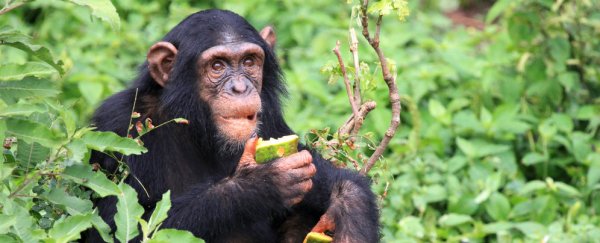Similar to humans, Chimpanzees have the ability to make vocal sounds. These can be used as alarm calls to warn group members of danger, or to refer to certain food sources in their environment. An apple, for instance, will evoke a grunt that is distinct from the sound used to identify a banana or a piece of bread.
However, it has generally been accepted that these grunts are the product of arousal states - that is, they are triggered by feelings of pleasure, or excitement, or frustration (if the chimpanzee is tired of eating the same mushy banana meal day after day) - and that chimpanzees have little control over the acoustic structure of these calls. In this crucial way, chimpanzee vocalisations are believed to be different from human language.
But it might not be that simple. A team of evolutionary psychologists from the University of York in the UK and the University of Zurich in Switzerland spent three years observing a population of adult chimpanzees, which were relocated from the Netherlands and forced to integrate with an existing group of chimps at the Edinburgh Zoo in Scotland.
What the team found was that, over time, the relocated chimps had the capacity to learn the 'foreign' grunts of the existing population.Their results have been published in the journal Current Biology.
"Chimpanzees produce acoustically distinct grunts in response to foods of low, medium or high quality, and in captivity they give distinct grunts for certain foods, including bananas, bread and mango," co-author Katie Slocombe of the University of York told Discovery News. She added that chimpanzees can understand the grunts of their companions, in so much as they can extract information, which helps guide their own search for food.
When the chimpanzees from the Netherlands were first introduced to the zoo in 2010 they had a distinct "high-pitched" vocal sound used to refer to apples - a food source they seemed to really enjoy. Meanwhile, the existing group of chimps, which weren't too thrilled with apples, made a low, disinterested grunt.
After one year, there had been no change in vocalisations, and interestingly, very little in the way of social fraternising between the two groups. "They weren't spending much quality time together, and there weren't many friendships," Slocombe told The BBC. "So they didn't seem to have any motivation to change their calling."
But this changed in 2013. When the researchers began to notice friendships forming between the chimpanzees of the different groups, they also noticed a convergence of their vocalisations - the Dutch chimps had begun to adopt the low, disinterested grunt of their Scottish counterparts, learning through social interaction. But importantly, the Dutch chimps continued to enjoy their apples.
"These data represent the first evidence of non-human animals actively modifying and socially learning the structure of a meaningful referential vocalisation," said Slocombe in a press release.
"Our findings indicate that primate referential call structure is not simply determined by arousal, and that the socially learnt nature of referential words in humans is likely to have ancient evolutionary origins."
Exactly why the chimps modify their grunts is unclear, but the researchers suspect it has to do with aiding social integration.
"If one was to make an analogy with human language, it could be the process of dialect change when people move between groups of speakers of the same language and subtly modify their accents to sound like the group into which they are moving, potentially as a way to aid social integration," co-author Simon Townsend of the University of Zurich told Discovery News.
Simon Kirby, a professor of language evolution at the University of Edinburgh, who wasn't involved in the study, told Discovery News: "One of the extraordinary things about human language is that we socially learn both the meanings and sounds of words as we grow up. This is important because it means languages aren't fixed, but can evolve culturally as they are passed down the generations."
"This new study is a striking, and surprising, demonstration that at least one part of this uniquely human ability is present in our close primate relatives. The sound of chimps' referentially meaningful calls really does seem to be shaped by social learning."
Source: Discovery News, The BBC
